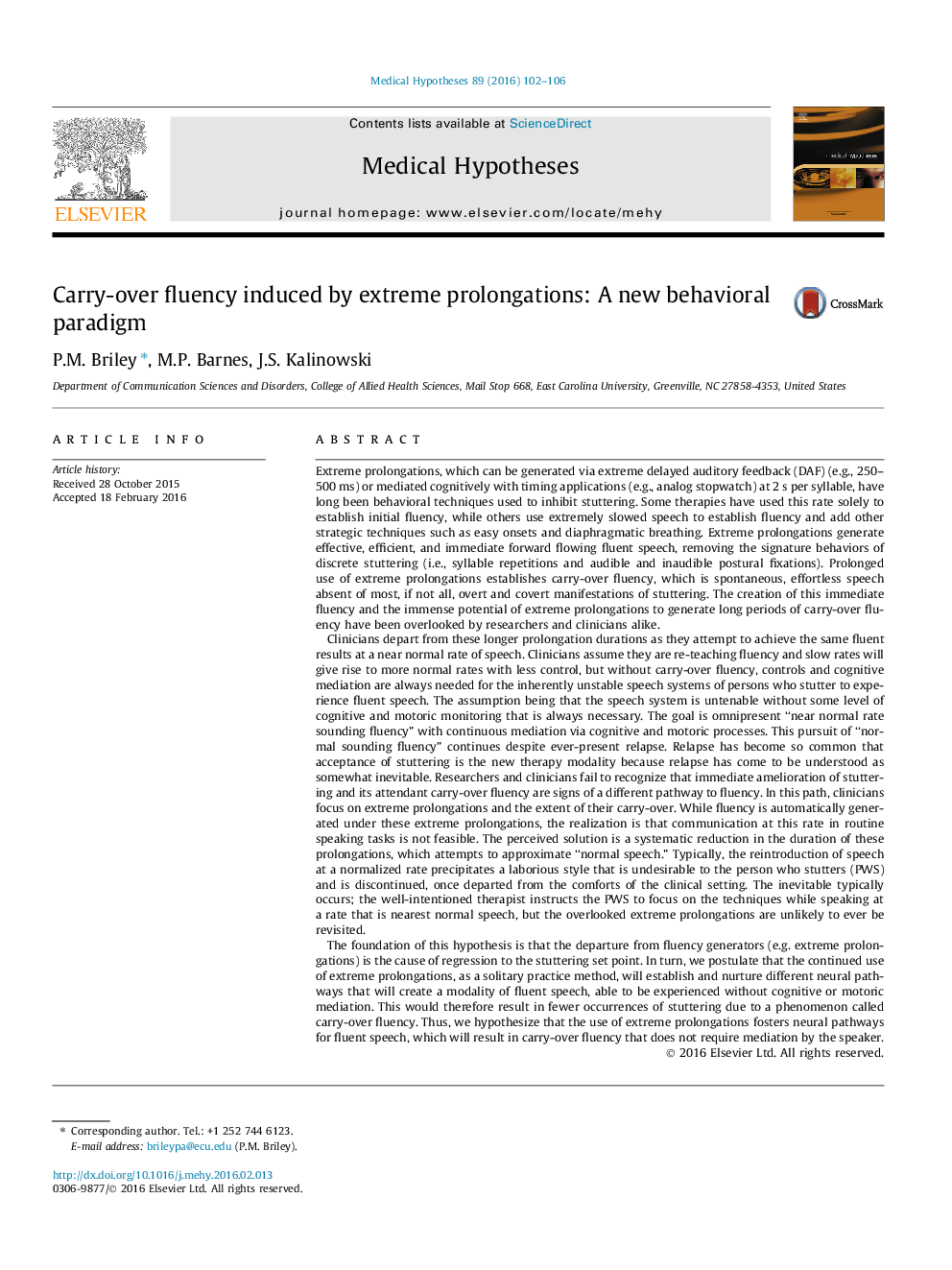| کد مقاله | کد نشریه | سال انتشار | مقاله انگلیسی | نسخه تمام متن |
|---|---|---|---|---|
| 5810719 | 1556556 | 2016 | 5 صفحه PDF | دانلود رایگان |
Extreme prolongations, which can be generated via extreme delayed auditory feedback (DAF) (e.g., 250-500Â ms) or mediated cognitively with timing applications (e.g., analog stopwatch) at 2Â s per syllable, have long been behavioral techniques used to inhibit stuttering. Some therapies have used this rate solely to establish initial fluency, while others use extremely slowed speech to establish fluency and add other strategic techniques such as easy onsets and diaphragmatic breathing. Extreme prolongations generate effective, efficient, and immediate forward flowing fluent speech, removing the signature behaviors of discrete stuttering (i.e., syllable repetitions and audible and inaudible postural fixations). Prolonged use of extreme prolongations establishes carry-over fluency, which is spontaneous, effortless speech absent of most, if not all, overt and covert manifestations of stuttering. The creation of this immediate fluency and the immense potential of extreme prolongations to generate long periods of carry-over fluency have been overlooked by researchers and clinicians alike.Clinicians depart from these longer prolongation durations as they attempt to achieve the same fluent results at a near normal rate of speech. Clinicians assume they are re-teaching fluency and slow rates will give rise to more normal rates with less control, but without carry-over fluency, controls and cognitive mediation are always needed for the inherently unstable speech systems of persons who stutter to experience fluent speech. The assumption being that the speech system is untenable without some level of cognitive and motoric monitoring that is always necessary. The goal is omnipresent “near normal rate sounding fluency” with continuous mediation via cognitive and motoric processes. This pursuit of “normal sounding fluency” continues despite ever-present relapse. Relapse has become so common that acceptance of stuttering is the new therapy modality because relapse has come to be understood as somewhat inevitable. Researchers and clinicians fail to recognize that immediate amelioration of stuttering and its attendant carry-over fluency are signs of a different pathway to fluency. In this path, clinicians focus on extreme prolongations and the extent of their carry-over. While fluency is automatically generated under these extreme prolongations, the realization is that communication at this rate in routine speaking tasks is not feasible. The perceived solution is a systematic reduction in the duration of these prolongations, which attempts to approximate “normal speech.” Typically, the reintroduction of speech at a normalized rate precipitates a laborious style that is undesirable to the person who stutters (PWS) and is discontinued, once departed from the comforts of the clinical setting. The inevitable typically occurs; the well-intentioned therapist instructs the PWS to focus on the techniques while speaking at a rate that is nearest normal speech, but the overlooked extreme prolongations are unlikely to ever be revisited.The foundation of this hypothesis is that the departure from fluency generators (e.g. extreme prolongations) is the cause of regression to the stuttering set point. In turn, we postulate that the continued use of extreme prolongations, as a solitary practice method, will establish and nurture different neural pathways that will create a modality of fluent speech, able to be experienced without cognitive or motoric mediation. This would therefore result in fewer occurrences of stuttering due to a phenomenon called carry-over fluency. Thus, we hypothesize that the use of extreme prolongations fosters neural pathways for fluent speech, which will result in carry-over fluency that does not require mediation by the speaker.
Journal: Medical Hypotheses - Volume 89, April 2016, Pages 102-106
